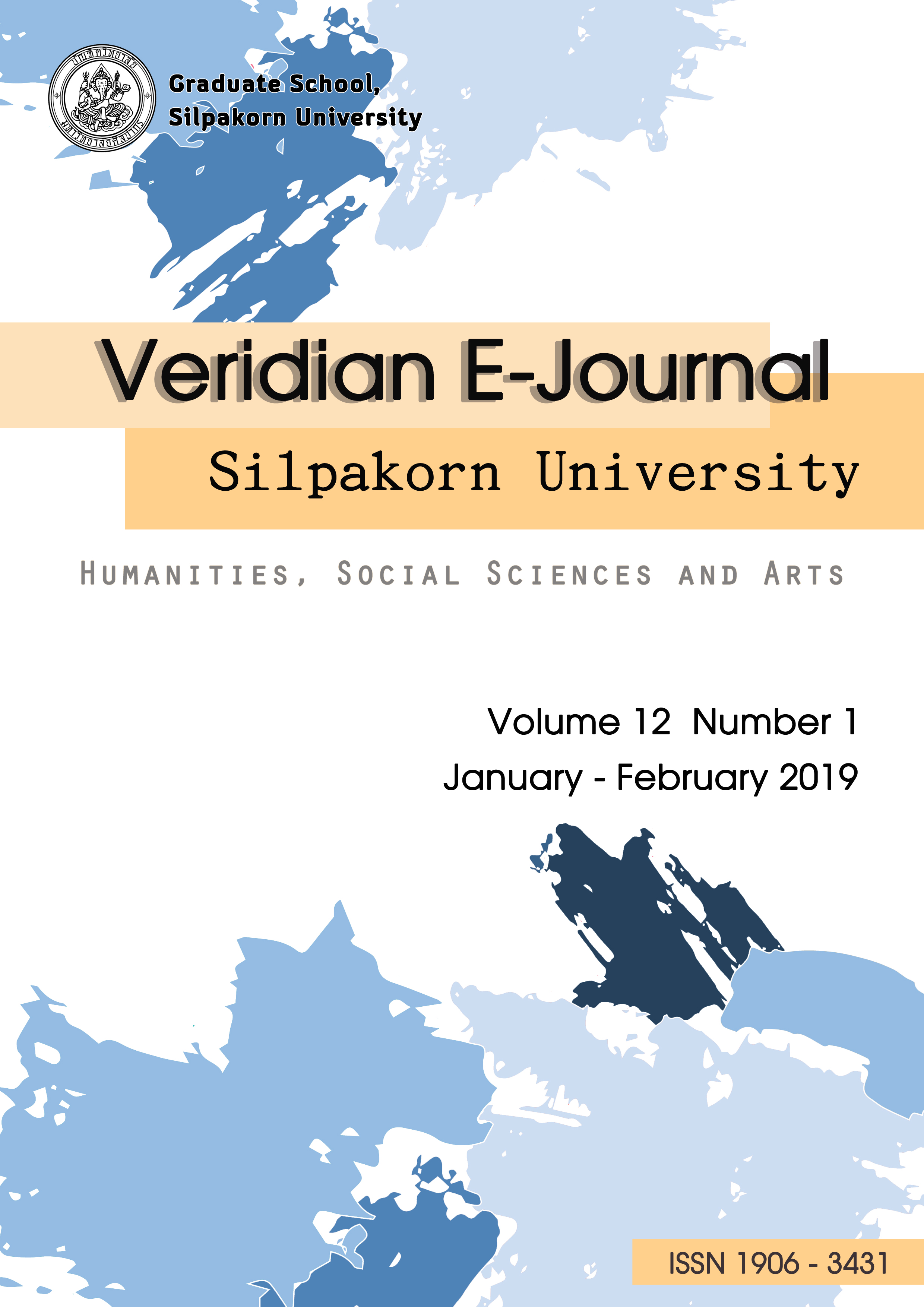ผลการเรียนการสอนด้วยรูปแบบการสร้างข้อโต้แย้งโดยใช้แผนผังออนไลน์ร่วมกับแท็กคลาวด์ที่มีต่อความสามารถในการให้เหตุผลทางวิทยาศาสตร์ของนักเรียนมัธยมศึกษาตอนปลาย(Effects of Instruction Using Generative Argument Instructional Model with Online Mapping and Tagcloud on Scientific Reasoning Abilities of Upper Secondary School Students)
Main Article Content
Abstract
การวิจัยครั้งนี้มีวัตถุประสงค์เพื่อ (1) ศึกษาผลของความสามารถในการให้เหตุผลทางวิทยาศาสตร์ของนักเรียนกลุ่มที่เรียนด้วยรูปแบบการสร้างข้อโต้แย้งโดยใช้การสร้างแผนผังออนไลน์ร่วมกับแท็กคลาวด์ (2) เปรียบเทียบความสามารถในการให้เหตุผลทางวิทยาศาสตร์ในช่วงก่อนเรียน ระหว่างเรียนและหลังเรียนของนักเรียนกลุ่มที่เรียนด้วยรูปแบบการสร้างข้อโต้แย้งโดยใช้การสร้างแผนผังออนไลน์ร่วมกับแท็กคลาวด์ และ (3) เปรียบเทียบความสามารถในการให้เหตุผลทางวิทยาศาสตร์หลังเรียนระหว่างนักเรียนกลุ่มที่เรียนด้วยรูปแบบการสร้างข้อโต้แย้งแบบออนไลน์กับนักเรียนกลุ่มที่เรียนด้วยรูปแบบการสร้างข้อโต้แย้งโดยใช้การสร้างแผนผังออนไลน์ร่วมกับแท็กคลาวด์ กลุ่มตัวอย่างคือ นักเรียนระดับชั้นมัธยมศึกษาปีที่ 6 โรงเรียนมัธยมวัดธาตุทอง จำนวน 2 ห้องเรียน แบ่งเป็นกลุ่มทดลองที่เรียนด้วยรูปแบบการสร้างข้อโต้แย้งโดยใช้การสร้างแผนผังออนไลน์ร่วมกับแท็กคลาวด์ และกลุ่มควบคุมที่เรียนด้วยรูปแบบการสร้างข้อโต้แย้งแบบออนไลน์ เครื่องมือที่ใช้ในการวิจัย ประกอบด้วย (1) แบบวัดความสามารถในการให้เหตุผลทางวิทยาศาสตร์ (2) แบบสังเกตพฤติกรรม และ (3) ระบบการเรียนรู้ด้วยรูปแบบการสร้างข้อโต้แย้งโดยใช้แผนผังออนไลน์ร่วมกับแท็กคลาวด์ วิเคราะห์ข้อมูลด้วยสถิติค่าเฉลี่ย ส่วนเบี่ยงเบนมาตรฐาน และ Repeated Measures ANOVA ผลการวิจัยสรุปได้ดังนี้ (1) นักเรียนกลุ่มทดลองมีคะแนนเฉลี่ยความสามารถในการให้เหตุผลทางวิทยาศาสตร์หลังเรียนสูงกว่าระหว่างเรียนและก่อนเรียนอย่างมีนัยสำคัญทางสถิติที่ระดับ 0.05 และ (2) นักเรียนกลุ่มทดลองมีคะแนนเฉลี่ยความสามารถในการให้เหตุผลทางวิทยาศาสตร์หลังเรียนสูงกว่านักเรียนกลุ่มควบคุมอย่างมีนัยสำคัญทางสถิติที่ระดับ 0.05
Article Details
References
1. Institute for the Promotion of Teaching Science and Technology.(2016). sarup phonlakā rawi čhai khrōngkān TIMSS sō̜ngphansiphā [Result of research TIMSS 2015], Institute for the Promotion of Teaching Science and Technology.
สถาบันส่งเสริมการสอนวิทยาศาสตร์และเทคโนโลยี. (2559). สรุปผลการวิจัยโครงการ TIMSS 2015, สถาบันส่งเสริมการสอนวิทยาศาสตร์และเทคโนโลยี พิมพ์เผยแพร่, 33 หน้า.
2. Jampamoon, W.(2012). “phon khō̜ng kānchai rūpbǣp kān rīan kānsō̜n kānsāng khō̜ tōyǣng thī mī tō̜ phon samrit thāngkān rīanrū witthayāsāt læ khwāmsāmāt nai kān khit chœ̄ng hētphon khō̜ng nakrīan matthayommasưksā tō̜n ton” [Effects of using the generate an argument instructional model on science learning achievement and reasoning thinking ability of lower secondary school students]. Master Thesis, Faculty of Education, Chulalongkorn University.
วรัญญา จำปามูล.(2555). ผลของการใช้รูปแบบการเรียนการสอนการสร้างข้อโต้แย้งที่มีต่อผลสัมฤทธิ์ทางการเรียนรู้วิทยาศาสตร์และความสามารถในการคิดเชิงเหตุผลของนักเรียนมัธยมศึกษาตอนต้น (ปริญญามหาบัณฑิต). สาขาการศึกษาวิทยาศาสตร์. คณะครุศาสตร์, จุฬาลงกรณ์มหาวิทยาลัย.
3. Ministry of Education.(2008). laksūt kǣn klāng kānsưksā naphư̄n thān Phutthasakkarāt sō̜ngphanhārō̜ihāsipʻet [Curriculum core of basic basic education 2008]. Bangkok: Ministry of Education.
กระทรวงศึกษาธิการ (2551). หลักสูตรแกนกลางการศึกษาขั้นพื้นฐาน พุทธศักราช 2551. กรุงเทพมหานคร: กระทรวงศึกษาธิการ.
4. Pongsthana, N.(2016). “phon khō̜ng kānčhatkān rīan kānsō̜n bǣp tōyǣng læ pramœ̄n thī mī tō̜ khwāmsāmāt nai kānhai hētphon chœ̄ng witthayāsāt læ phon samrit thāngkān rīan chīwawitthayā khō̜ng nakrīan radap matthayommasưksā tō̜n plāi” [Effects of argumentation and evaluation instruction on scientific reasoning ability and biology learning achievement of upper secondary school students]. Master Thesis, Faculty of Education, Chulalongkorn University.
ณรงค์ชัย พงษ์ธะนะ. (2559). ผลของการจัดการเรียนการสอนแบบโต้แย้งและประเมินที่มีต่อความสามารถในการให้เหตุผลเชิงวิทยาศาสตร์และผลสัมฤทธิ์ทางการเรียนชีววิทยาของนักเรียนระดับมัธยมศึกษาตอนปลาย (ปริญญามหาบัณฑิต). สาขาการศึกษาวิทยาศาสตร์ คณะครุศาสตร์ จุฬาลงกรณ์มหาวิทยาลัย.
ภาษาต่างประเทศ
1. Driver, R., Newton, P., & Osborne, J. (2000). Establishing the norms of scientific argumentation in classrooms. Science Education, 84(3), 287-312.
2. Duschl, R. A., & Osborne, J. (2002). Supporting and Promoting Argumentation Discourse in Science Education. Studies in Science Education, 38(1), 39-72.
3. Dwyer, C. P., Hogan, M. J., & Stewart, I. (2012). An evaluation of argument mapping as a method of enhancing critical thinking performance in e-learning environments. Metacognition Learning, 7, 219-244.
4. Dwyer, C. P., Hogan, M. J., & Stewart, I. (2013). An examination of the effects of argument mapping on students’ memory and comprehension performance. Thinking Skills and Creativity, 8, 11-24.
5. Eggert, S., Nitsch, A., Boone, W. J., Nückles, M., & Bögeholz1, S. (2017). Supporting Students’ Learning and Socioscientific Reasoning About Climate Change—the Effect of Computer-Based Concept Mapping Scaffolds. Research Science Education, 47(1), 137-159.
6. Engelmann, K., Neuhaus, B. J., & Fischer, F. (2016). Fostering scientific reasoning in education – meta- analytic evidence from intervention studies. Educational Research and Evaluation, 22(5-6), 333-349.
7. Erduran S. (2007). Methodological Foundations in the Study of Argumentation in Science Classrooms. In: Erduran S., Jiménez-Aleixandre M.P. (eds) Argumentation in Science Education. Science & Technology Education Library, vol 35. Springer, Dordrecht
8. Lin, S.-Y., & Xie, Y. (2017). Effects of tagcloud-anchored group discussions on pre-service teachers’ collaborative knowledge construction. Australasian Journal of Educational Technology, 33(2), 73-85.
9. Morin, O., Simonneaux, L., & Tytler, R. (2017). Engaging With Socially Acute Questions: Development and Validation of an Interactional Reasoning Framework. journal of research in science teaching, 54(7), 825-851.
10. OECD. (2017). PISA 2015 Assessment and Analytical Framework: Science, Reading, Mathematic, Financial Literacy and Collaborative Problem Solving. Paris: OECD Publishing.
11. Sampson, V., & Clark, D. B. (2011). A Comparison of the Collaborative Scientific Argumentation Practices of Two High and Two Low Performing Groups. Research Science Education, 41, 63-97.
12. Sampson, V. and J. P. Walker (2012). Argument-Driven Inquiry as a Way to Help Undergraduate Students Write to Learn by Learning to Write in Chemistry. International Journal of Science Educaion, 34(10), 1443-1485.
13. Xie, Y., & Lin, S.-Y. (2016). Tagclouds and group cognition: Effect of tagging support on students’ reflective learning in team blogs. British Journal of Educational Technology, 47(6), 1135-1150.

